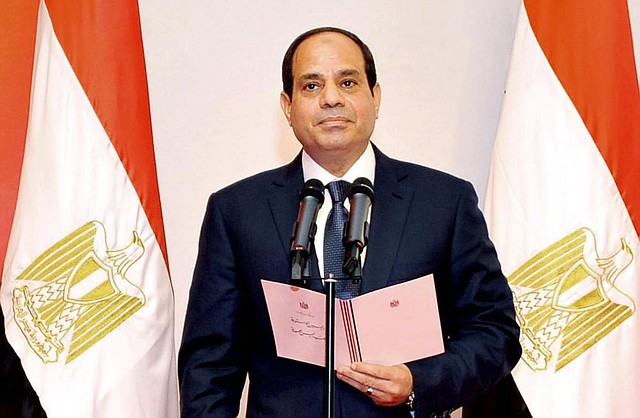Egypt swears in new president
El-Sissi warns foes of government
President Abdel-Fattah el-Sissi takes his oath of office Sunday at the Supreme Constitutional Court in Cairo, Egypt.
Monday, June 9, 2014
CAIRO -- Egypt's former military chief Abdel-Fattah el-Sissi, winner by a landslide in last month's presidential election, was sworn into office Sunday nearly a year after he ousted the nation's first freely elected leader.
The retired field marshal called for unity and hard work while vowing that there would be no reconciliation with those who took up arms against the government and Egyptians. That was a thinly veiled reference to supporters of Mohammed Morsi, the Islamist president removed by el-Sissi in July, and Islamic militants waging attacks against the government.
"There will be reconciliation between the sons of our nation except those who had committed crimes against them or adopted violence," el-Sissi said. "There will be no acquiescence or laxity shown to those who resorted to violence."
He did not mention by name Morsi's Muslim Brotherhood, which was declared a terrorist group by the government in December. But el-Sissi's rise coincides with the detention of thousands and the killing of hundreds of Morsi supporters.
El-Sissi also vowed to fight corruption and appeared to make an overture to pro-democracy and secular youth activists, many of whom boycotted last month's presidential election. They accuse the new president of reviving toppled autocrat Hosni Mubarak's police state, pointing to a law passed last year that restricts protests as well as the jailing of a number of well-known activists.
He peppered his 55-minute address with references to "freedom, social justice and bread," the main slogan by youth groups behind the January 2011 uprising that ended Mubarak's 29-year rule.
El-Sissi's July 3 ouster of Morsi triggered a cycle of deadly violence and further polarized Egypt. Now, el-Sissi faces the tasks of reviving Egypt's anemic economy, fighting Islamic militants and cementing his rule after three years of turmoil in the Arab world's most populous country.
Under his rule, el-Sissi said Egypt will work for regional security and stability. He also called on Egyptians to work hard so that their rights and freedoms could grow.
"Let us differ for the sake of our nation and not over it; let us do that as part of a unifying national march in which every party listens to the other objectively and without ulterior motives," he said. "Let our differences be the source of enrichment, diversity and giving that add the spirit of cooperation and love to our work."
Supporters drew comfort from el-Sissi's ascension, convinced he is the right man for Egypt. Tens of thousands gathered Sunday at Cairo's Tahrir Square, birthplace of the 2011 uprising, to celebrate his inauguration.
"I feel like I'm breathing new oxygen," said Mamdouh Ali Bilal, a retired army colonel who celebrated at Tahrir. "El-Sissi is bringing hope with him, unlike the Brotherhood people. They were like a dark room that makes us constantly afraid of what may be planned next for us."
Yet Egypt's recent, tumultuous history remained close by. El-Sissi, 59, took the oath of office at the Supreme Constitutional Court, the same venue where Morsi, now on trial for charges that carry the death penalty, was sworn in two years ago.
The court is a short distance away from a military hospital where Mubarak is being held. Mubarak was convicted last month on graft charges and sentenced to three years in prison. He is also being retried over the killing of protesters during the 18-day revolt after his original conviction and life sentence were successfully appealed.
Authorities declared Sunday a national holiday for el-Sissi's inauguration and police and troops deployed throughout Cairo. The entire Cabinet, as well as el-Sissi's wife, four children and their spouses, attended the swearing-in ceremony.
Outgoing interim President Adly Mansour, installed by el-Sissi after the overthrow, will return to his post as the chief justice of the Supreme Constitutional Court. El-Sissi awarded him the nation's highest honor, the Nile Medallion, in recognition of what he said were Mansour's "glorious services" to Egypt.
El-Sissi also welcomed dozens of local and foreign dignitaries for the inauguration, including the kings of Jordan and Bahrain, the emir of Kuwait and the crown princes of Saudi Arabia and Abu Dhabi, the largest and wealthiest of the seven sheikdoms that make up the United Arab Emirates.
The five Arab nations backed el-Sissi's ouster of Morsi. Saudi Arabia, Kuwait and the Emirates since have provided billions of dollars to shore up Egypt's ailing finances and are expected to give more while the country rebuilds.
In his late Sunday address, el-Sissi made it clear that his priorities are security and the economy, vowing to alleviate the burden on the nation's poor. He also made clear that he was determined to place boundaries on freedoms and defend the "prestige of the state."
Information for this article was contributed by Mariam Rizk of The Associated Press.
A Section on 06/09/2014
